Hornets and wasps
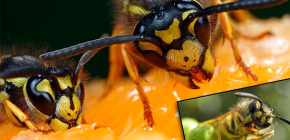
Wasps in a summer cottage or in the wild can be found eating literally everything. They spoil grapes and blackberries, feed on raspberries and ripe plums, flock to meat and fish in large numbers. And at the same time, books and encyclopedias still claim that wasps are predators, and eat insects in bulk. It may seem that these stinging arthropods are absolutely omnivores. But in fact, this is not so - wasps have fairly strict eating habits, which become well understood if you get to know them better. What do they actually eat?
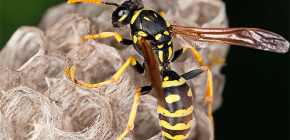
It's one thing when wasps fly from time to time, for example, onto the veranda of a private house, and quite another when insects make their nest in the attic, in a shed, or even in a toilet located on the site. If in the first case one wasp can be easily slammed or simply driven away, then near the nest there is a real threat of constant attacks of wasps on people and domestic animals. In order not to expose yourself to the risk of being bitten, in such cases it is highly desirable to remove the wasps from the house or from the territory of the site as soon as possible, as soon as they have made their nest here. We will talk further about how to carry out the procedure for getting rid of insects effectively and at the same time safely for your health ...
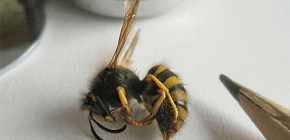
Do you think the wasp has a stinger? It may seem strange, but for many people the answer to this simple question is far from obvious, because after a wasp sting, unlike bees, no sting remains in the skin. Let's take a closer look at what and how exactly wasps bite - with their jaws or still with a sting, with which they, like bees, inject poison under the code of the victim ...
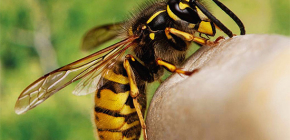
Mention of the benefits of bee venom today can be found even in serious literary sources, and in folk medicine it has long been widely used to treat a wide variety of diseases. Could wasp venom be just as useful? After all, it is known that wasps sting more painfully than bees, which means that it can be assumed that their poison is stronger and, possibly, more effective. And after each bite, the wasp feels great and does not die, so the use of wasp venom for the benefit of human health would be absolutely humane in relation to the insect. Well, let's see if wasp venom can really be useful and how much such a benefit would outweigh the harm from it as a biological toxin...
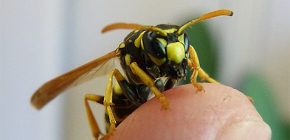
In most cases, wasp stings do not pose a serious danger to humans, and the unpleasant consequences of them in the form of pain, swelling and itching pass quickly enough. However, in a number of situations, even a single wasp sting can be very, very dangerous, not to mention cases when insects attack in a swarm. We will talk about the potential danger of wasp stings and their possible consequences further and in more detail.
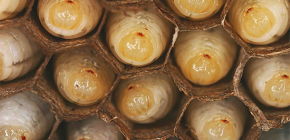
We all have a good idea of what wasps look like, namely, their adult individuals, with the usual black and yellow striped coloring. But not everyone can see wasp larvae: not only do adult insects carefully hide their offspring from prying eyes, they also diligently guard the brood, fearlessly attacking anyone who dares to approach the nest. Not surprisingly, most people can only guess about what wasp larvae look like. Let's take a closer look at these "kids" living in wasp nests ...
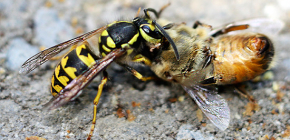
Wasps in the apiary are like a wolf in a sheepfold: these predators feed their larvae with insects, and they are also not averse to feasting on honey if the opportunity presents itself. Moreover, some types of large wasps almost specialize in the destruction of bee colonies. It is not surprising that apiaries attract striped predators, just as a gypsy camp attracts lice and bedbugs. In some cases, wasps can even cause the death of a young or weakened bee family, so the fight against them in the apiary is relevant for many beekeepers and often requires a significant investment of time and effort. So, let's figure out how to properly protect bees from wasps ...
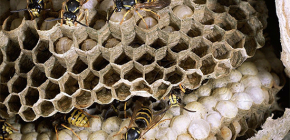
Wild wasps are very interesting, highly organized and quite nice creatures. The variety of wild wasps is not limited to ordinary paper wasps, yellow with black bandages, which willingly flock to ripe grapes or fish on the veranda, as well as large and terrible hornets. These insects are much more common than we think, just not all of them are perceived by an ordinary city dweller or summer resident as wasps.Let's see what wild wasps are like, how dangerous they can be, how these interesting insects build nests and take care of their larvae ...
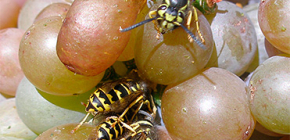
Did the wasps beat the grapes and turn the beautiful shiny clusters into tattered "tatters"? Unfortunately, this problem affects many gardeners - and especially those who grow grapes for direct sale. And since many farmers have already encountered this disaster, various solutions have been found to protect grapes from insatiable insects. You just have to choose a method of protection that will be the most effective, convenient and inexpensive in your case. Let's look at the various crop protection options in more detail ...
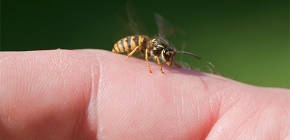
Although a wasp sting feels in many ways similar to a bee sting, however, wasp venom is practically not used in either traditional or folk medicine. It would seem, why? And is the effect of wasp venom really a little different from the effect after bee venom enters the tissues? To answer these questions, let's try to figure out exactly how wasp venom affects the human body and whether it can bring health benefits ...
In this section, we consider interesting details of the life of hornets and wasps, as well as methods of dealing with these dangerous insects ...
